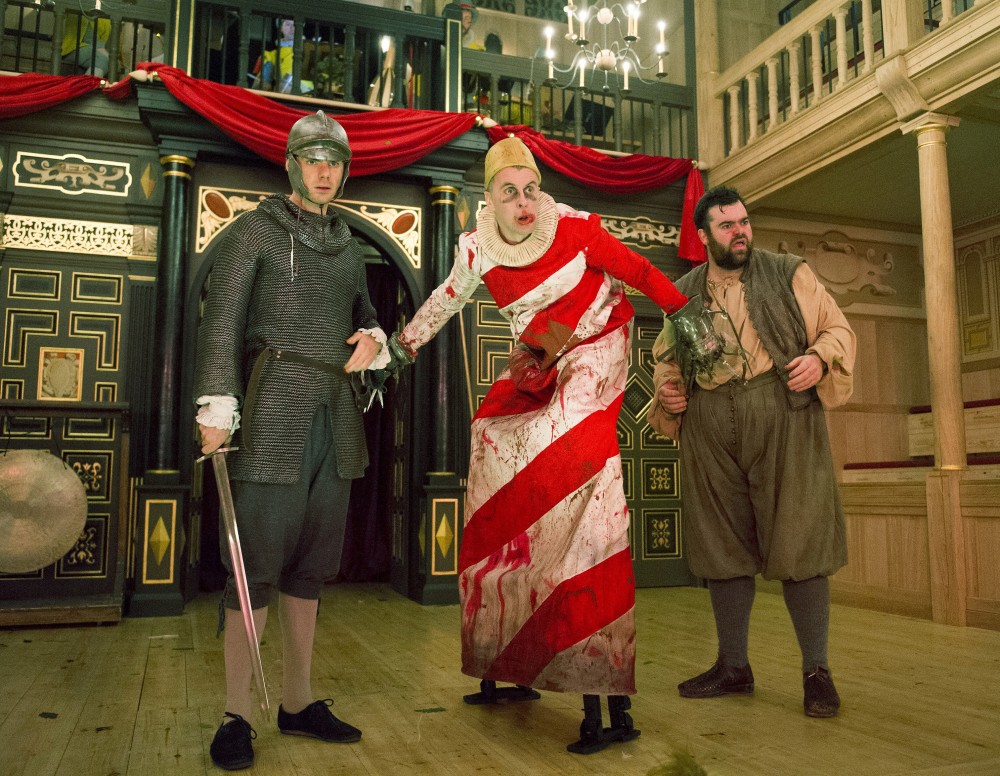The Knight of the Burning Pestle, Shakespeare’s Globe
reviewed for The Spectator, 27 February 2014

Matthew Needham (Rafe), Brendan O’Hea (Host) and Dean Nolan (George) in The Knight of the Burning Pestle at the Sam Wanamaker Playhouse.
Photo credit: Alastair Muir
If Monty Python were working in 1607, they might have come up with something like Francis Beaumont’s raucous The Knight of the Burning Pestle. A parody of popular chivalric romances of the day, the play follows the adventures of Rafe, an oafish grocer’s apprentice who decides to dub himself “The Knight of the Burning Pestle”, or in modern English, “The Knight of the Diseased Penis”. Yes, this play is a three-hour syphilis joke.
So it’s a curious choice for the first season of the Sam Wanamaker Playhouse at Shakespeare’s Globe, an indoor alternative to the longer-standing open air Globe. But as our hero wanders from The Strand to Waltham Forest, via Aldgate and Mile End, the reasons for such an obscure selection become evident, if not always convincing. The indoor Jacobean theatre is an exquisitely restored London landmark, a nigh-replica of the private venues which kick-started London’s theatrical heritage even before the Globe. And Burning Pestle, with its tart allusions to neighbourhood rivalries and enthusiastic commentary by audience representatives, is a sardonic love-letter to London and its theatre.
But Lord, does it take its time about it. In part, this is due to a bewildering array of intermissions: as well as the fifteen minute interval, we’re treated to three separate bursts of a four-minute ‘interlude’: not enough time to dash to the loo (I tried), but just enough time to clamber across your aggrieved neighbours, boost the Globe’s coffers by buying sticky ice cream, and spill it. I’m told the decision reflects concern that hard wooden seats might leave the audience desperate to stretch their legs. Actually, the space is so crammed that fighting one’s way out for a mere four minutes feels anti-social, and to give the Wanamaker its credit, the seats themselves aren’t as uncomfortable as rumoured.
And at its best, this is also a play about fact and fiction, about whether an audience can or should detach ourselves emotionally from what we watch. A herald announces a romantic comedy about an apprentice eloping with his greedy merchant-master’s daughter: immediately, a grocer in the audience (Phil Daniels) leaps in to defend merchants, and demands that instead the company stage a play about a knight errant, starring his own favoured apprentice, Rafe. The herald compromises, so we get growing havoc as Rafe’s supposedly spontaneous digressions hijack the plot of the pre-rehearsed romantic comedy.
Pauline McLynn, as the grocer’s wife, represents every audience member who’s ever got carried away in the theatre. Those who know her as Father Ted’s Mrs Doyle will recognize the same gift for finding the pathos in the most pathetic of characters. Leaping up to interrupt a crime of passion, she speaks for everyone who’s ever yearned to interrupt Othello, and reliving the fear of losing a child, she gives the first hint that there might be more to women’s voices in Jacobean city comedy than the worn-out cliché of the drab shrew.
Thanks in part to the luminous Alex Waldmann as the play’s real hero, it’s in the romantic comedy that this hybrid production really finds its heart. Waldmann was captivating as the innocent Antonio in the Globe’s recent Duchess of Malfi: here as Jasper, determined to marry his true love whatever the cost, he finds the necessary stillness at the centre of this madcap carnival. For the cruder elements of the production, I suggest you go with an open mind and a drink in hand. If I’d only been as smashed as Beaumont’s Jacobean audience likely were, I suspect I’d have had a lot more fun.







